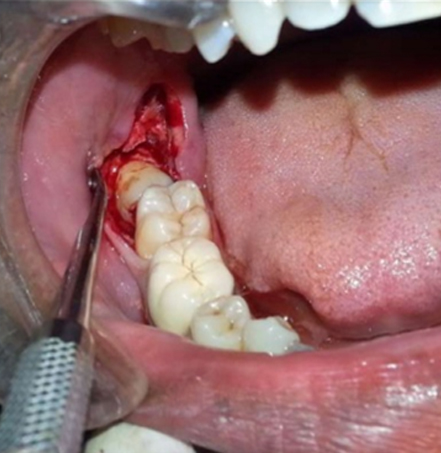Wisdom tooth extraction is a surgical procedure to remove one or more wisdom teeth — the four permanent adult teeth located at the back corners of your mouth on the top and bottom.
If a wisdom tooth doesn't have room to grow (impacted wisdom tooth), resulting in pain, infection or other dental problems, you'll likely need to have it pulled. Wisdom tooth extraction may be done by a dentist or an oral surgeon.
An impacted wisdom tooth may:

You'll likely need your impacted wisdom tooth pulled if it results in problems such as:
Is removal of impacted tooth painful?
What's an impacted molar?
Impacted wisdom teeth are third molars at the back of the mouth that don't have enough room to emerge or develop normally. Wisdom teeth are the last adult teeth to come into the mouth.
Wisdom teeth are the last molars on each side of the jaw. They are the last teeth to emerge, or erupt, usually when a person is between 16 and 24. Adults usually have 4 wisdom teeth, one in each corner of the jaw. As wisdom teeth are the last permanent teeth to come through there is often not enough room left in your mouth to accommodate them. This can lead to impacted wisdom teeth – teeth that are trapped beneath the gum tissue by other teeth or bone. If teeth are impacted, swelling and tenderness of the gum may occur and antibiotics may be prescribed to ease the inflammation.
Wisdom teeth that only partially emerge or come through crooked may also lead to painful crowding and disease. Food and bacteria can get trapped around the edge of the wisdom tooth, causing a build-up of plaque, which can lead to tooth decay, gum
disease, cellulitis or other problems. Since teeth removed before the age of 20 have less developed roots and fewer complications, you should consult your dentist to have your wisdom teeth evaluated to see if they need to be removed, especially is they have started to cause problems.
Tooth extraction is the removal of a tooth from its socket in the bone. If you are facing a tooth extraction, it can seem a little daunting and nerve-wracking. But did you know that tooth extraction is a relatively standard dental procedure?
Reasons tooth extraction :-
How long does it take to recover from a tooth extraction?
How painful is a tooth extraction?
Is Getting A Tooth Pulled Painful? While you shouldn't experience pain, you may feel a slight pressure as the tooth is being loosened and extracted. You might also hear a snapping or creaking sound. This is perfectly normal, as the tooth and its socket are both hard tissues.
Copyright © 2022 Fortino Dental.